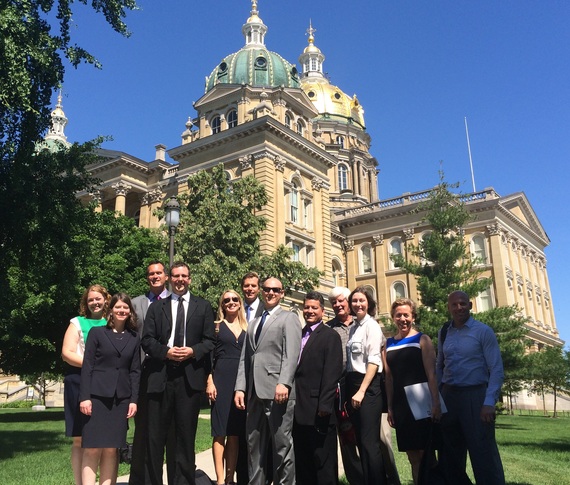
When it comes to the urgent need to cut carbon pollution and address climate change, businesses -- and business-minded lawmakers -- get it.
I just spent a few days in Des Moines, Iowa, with some great members and friends of Environmental Entrepreneurs (E2), discussing the EPA's new Clean Power Plan to cut carbon pollution and the economic benefits it could bring to Midwestern states.
While the EPA plan establishes guidelines to cut 30 percent of the nation's carbon pollution from power plants by 2030, it will be up to governors to implement strong programs to meet the standards in ways that are best for their states.
Joining us in Des Moines were farmers and former NFL stars, military veterans and mayors, evangelicals and executive coaches. We met with the staffs of Gov. Branstad and Sen. Grassley, two Republicans who, in the past, have been supportive of clean energy and will be key to a strong state-implementation plan there. We also met with the mayors of Des Moines and Fairfield, two cities on the forefront of addressing climate change and reaping the economic benefits of doing so.
What Iowans -- and so many other Americans -- realize is this: Cutting carbon pollution is good for the environment and the economy.
My friends in the bellwether state of Iowa are a reflection of the rest of America.
A recent Wall Street Journal/NBC News poll found that about two thirds (67 percent) of Americans support the EPA's plans to cut carbon pollution from power plants. A separate ABC News/Washington Post poll had nearly identical results, including the finding that 57 percent of Republicans and 79 percent of Democrats support federal limits on greenhouse gases from power plants.
E2 members and friends at the Iowa Capitol
For businesses, not taking action to cut carbon pollution and address climate change is a business risk that can have serious results.
According to "Risky Business," the groundbreaking new report by co-chairs Michael Bloomberg, Henry Paulson, and Tom Steyer, sea-level rise and coastal storms could sap $35 billion out of our economy every year.
Our residential and commercial electricity bills could increase by $12 billion because of temperature extremes that are now the new normal.
Farmers in the South and in Midwestern states like Iowa could soon see declines in crop yields of 10 to 20 percent, according to the report.
On the day that "Risky Business" was being released, E2 member and farmer David Kolsrud was working his fields near the Iowa-South Dakota border, trying to recover from the damage of nearly 20 inches of rain before he could join us in Des Moines.
As David puts it, climate change is creating a mess for the agriculture industry and for towns and cities like his all across the country.
In 2012 taxpayers shelled out an average of $1,100 to clean up from extreme weather disasters, according to the Natural Resources Defense Council (NRDC). E2 is an NRDC affiliate.
The good news is that cutting carbon pollution under the EPA's new Clean Power Plan can lessen the risk of some of the climate-change-driven disasters that farmers like David are dealing with.
In states that adopt strong implementation plans, the carbon standards also could be a major economic catalyst that will help energy efficiency and renewable-energy companies.
Reducing carbon pollution from power plants under the EPA proposal could create 274,000 new jobs in energy efficiency and other sectors, NRDC estimates. It could breathe new life into the wind, solar and other renewable sectors and free up new capital by reducing electricity costs through energy efficiency.
In places like Iowa, that's good for businesspeople like Emily Rice, who works for a Des Moines energy-efficiency company, and it's good for her customers.
"You can always lower your energy costs (through energy efficiency), especially with new innovation that comes out," Emily said during a retreat we held prior to meeting with state and local officials.
Policies like the EPA's Clean Power Plan will drive innovation and deployment of energy-efficiency technologies.
It also will drive the shift to renewable energy.
That will help companies like Integrated Power Corp., a solar company run by Iowa City native Tim Dwight. He also runs the Iowa Solar Energy Trade Association.
"You have to have these policies," Tim said. "They're very, very important to move new innovation and new technology in the marketplace."
And new innovation and new technology, Tim is quick to add, creates jobs. Lots of jobs.
Our nation now has a plan that will cut carbon pollution, address climate change and create new economic opportunities and jobs.
Entrepreneurs and other businesspeople like those in Iowa are ready for the next step: for their governors to support the standards and develop strong implementation plans that will help their state's economy -- and their state's environment.

